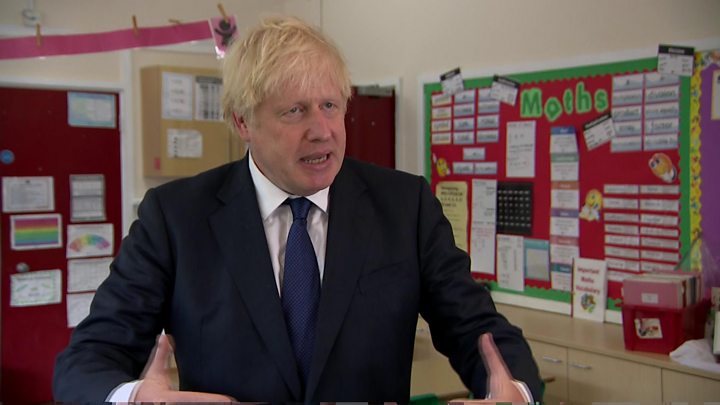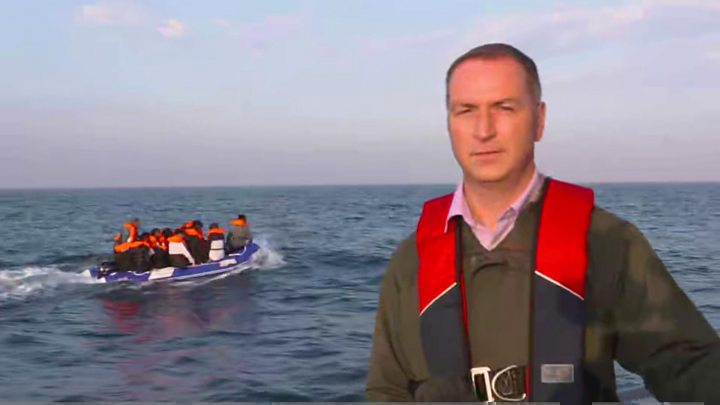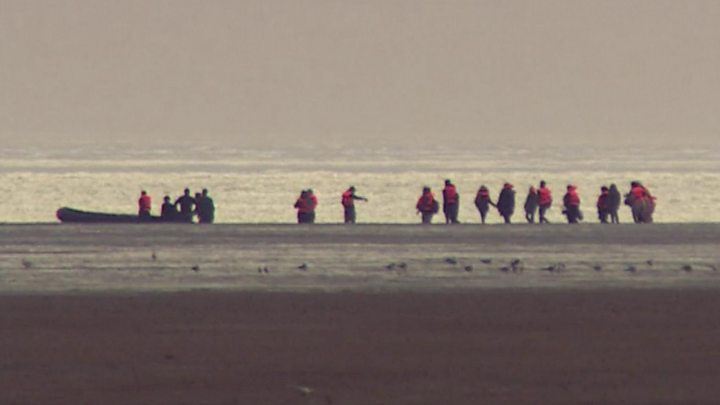
Media playback is unsupported on your device
The UK needs to consider changes to asylum laws to deter migrants from crossing the English Channel, Boris Johnson has said.
The prime minister said it was currently "very, very difficult" to legally return people who arrive in the UK from France using small boats.
More than 4,000 people have successfully crossed the English Channel this way so far this year.
UK and French ministers will meet later to discuss how to reduce this number.
Immigration Minister Chris Philp is travelling to Paris for talks, accompanied by the newly appointed Clandestine Channel Threat Commander Dan O'Mahoney, to demand stronger measures from the French authorities.
The UK government has said it wants to work with the French authorities to make the route "unviable".
Speaking ahead of the meeting, the UK's former national security adviser Lord Ricketts said the UK may need to pay for increased enforcement along the French coast.
"The French do have 300km of coastline facing the UK which is quite hard to police and I think a lot of the money they are asking for is to reinforce mobile patrols up and down those beaches to stop people even getting into these boats," he said.
On Monday, Mr Johnson pledged to work with the French authorities to discourage people from making the "dangerous" journey across the channel.
But he added the UK also needed to look at "the panoply of laws that an illegal immigrant has at his or her disposal that allow them to stay here".
'Range of options'
The Ministry of Defence said on Monday it had sent an RAF Atlas transport aircraft to help Border Force spot small boats trying to cross the Channel.
The Home Office had asked defence chiefs for help to deal with migrants making the crossing.

Media playback is unsupported on your device
Since Thursday, more than 600 people have been intercepted on the route.
Downing Street said Border Force was looking at a "range of options," including new measures, to stop boats entering British waters.
EU Laws
The UK is currently following EU asylum law during its 11-month post-Brexit transition period following its departure from the bloc in January.
This includes the so-called Dublin regulation, which states that a person's asylum claim can be transferred to the first member state they entered.
The PM's spokesman said the UK wanted to replace the "inflexible and rigid" regulation with a new agreement on returns after December.

Media playback is unsupported on your device
He added that the current Dublin rules, which put a time limit on transfers, could be "abused by both migrants and their lawyers to frustrate the returns of those who have no right to be here".
In a letter to Home Secretary Priti Patel on Monday, 23 Tory MPs and two peers said the UK should refuse to sign up to a "similar agreement" to Dublin after December.
The group said ministers should do "whatever it takes" to deal with the problem, saying many of their constituents were angry that migrants had been put up in "expensive hotels" and given "immediate access" to financial support.
Image copyright PA Media Image caption Ms Patel went out on a police boat patrol during her visit to Dover on Monday."It is strikingly clear that, rather than a 'hostile environment', invading migrants have been welcomed," they wrote.
Dover MP Nathalie Elphicke, who was not one of the signatories, said Tuesday's talks were welcome but engagement at a higher level was needed to enable boats to be safely turned around and returned to France.
"There is no reason we can't come to an agreement with France on returns," she told BBC Radio 4's Today programme. "It's really important we work with the French on this issue as it's a joint issue."
Ms Patel, who met her opposite number Gérald Darmanin last month, has said the UK is committed to "shutting down" the route and dismantling the criminal gangs facilitating the illegal crossings.
Speaking during a visit to Dover on Monday, she said the current situation was "totally unacceptable" and the UK and France need to work together to address what was a "shared challenge".
Since the demolition of the infamous 'Jungle' nearly four years ago, French authorities have been successful in stopping other large-scale camps from forming.
But migrants do still arrive in Calais; they are just more scattered.
Greater security measures - including a wall built along the motorway with UK funding - have made it more difficult for migrants to stow away on lorries.
But that's led the people smugglers to increasingly turn to using the equally risky method of small boats.
The UK and France have worked closely on this for close to two decades.
The Treaty of Le Touquet which effectively 'moved' the UK border to Calais (and the French border to Dover) to allow checks to happen before crossings, was signed in 2003.
But they can't change geography.
Calais remains a magnet because it is only 20 miles from the UK - on a clear day in Dover, you can see the headlights of French traffic on the other side of the sea.
No amount of planes, walls or Navy deployments can alter that.
Quite apart from the humanitarian issue here, there is added political pressure for the UK government.
David Cameron was pretty roundly criticised for suggesting in 2016 that Brexit would mean the French would pull out of bilateral agreements and we'd see "Jungles" popping up on the South coast of England.
There's certainly no indication of that, but there's no doubt that the images of dinghies landing on Kent's beaches will be a difficult one for a government that has set huge store by its promise to 'take back control' of immigration.

 5 years ago
518
5 years ago
518 

